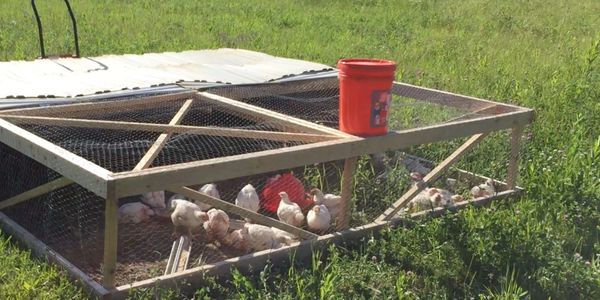REGENERATIVE & SUSTAINABLE AGRICULTURE

Using Permaculture Principles
Small-scale farming is changing the world, but with this model comes a great deal of work and careful planning. The diversity involved with permaculture creates many moving parts..
One of the things we considered with layout is the location of the permanent chicken coop next to the market garden. This allows easy access for them to provide light tilling and bug control. As well, its home to our egg layers that we visit a minimum of twice a day, so close proximity to the house was also key. This lead to all of the winter enclosures being attached one next to the other making it easier for daily chores. The animal feed and bedding is stored in the other side of the nesting area serving as a one stop shop. We use the natural landscape to assist in the design and assist with functionality. Items such as the position of the sun throughout the year and shade from the trees help us decide on placement. Using tree lines to act as wind breaks have proven vital to the survival on those windy days and often strong gust.

Animal Grazing
When it comes to raising and feeding our meat chickens, we believe that having them on pasture is the most beneficial for us, the environment, and of course the animals. While providing a high quality feed source for the livestock, the animals also give back to the ground they are grazing. We practice ‘rotational grazing’ using a chicken tractor, which is strategically rotating the livestock so that they graze a plot of pasture then are moved to a new one daily. This allows the previous plot to regrow to a healthy length for the next time the animals are on it. As well, we strongly believe that pasture raised animals yield top quality meat. We also love to give our animals the best quality of life while they are here, we like them to be able to do what animals do. They give us and our families food, so we give them the best life we can in return.

Mother Natures Assistance
Playing a crucial role in any garden is complex ecological landscape. Things such as the type of flowers you plant, and providing homes for various wildlife and insects can all have a huge impact on your success. On our farm, you will notice the giant hedgerow garden that lines the market garden. This has been planted with various types of flowers and plants all aimed at attracting bees, butterflies, dragonflies and other beneficial insects to the garden. You will also notice numerous birdhouses scattered throughout the farm, providing shelter and a great nesting spot for our feathery friends

Pesticide & Chemical Free
One of the main reasons we decided to begin growing our food, was to better be able to control what we were putting in our bodies and most importantly our children's every day. We are proud to be pesticide free and only practice natural farming techniques made up of hard work and lots of love
All of our weeds are hand picked and dealt with using hand tools and silage tarps.

No Till Farming
The most important step we can take to rebuild our soil is through practicing no till farming. By disturbing the earth, we are breaking up and destroying the habitats of the all organisms we have fought to build and attract. It also adds to greater soil erosion by exposing the soil to the elements without any protection.
Some of the benefits to no till is improved nutrient cycling, better soil moisture levels, better drainage, better crops and many more.
We continue to find different ways to protect our soil by doing things like more inter-planting and the use of cover crops, taking great care to ensure the soil is always protected and growing something. To aerate our beds, we use a tool known as a Broadfork. This allows us to provide a natural way to allow the required air spaces between particles for our plants roots to breathe. Soil creatures such as bacteria, fungi, and earthworms already do the aerating by themselves.

Our Helping Hands
Taking into account the long term goals and amount of work that is involved with such a small team, we have grown the farm with barnyard friends each playing there own unique role to the success of rejuvinating our soil. Our laying Chickens are free-range and are used in the gardens after a crop harvest. They consume a great deal of bugs in the soil- this means bug populations are severely decreased naturally in the soil. This adds to our ability to be pesticide free when growing our vegetables.
Pigs are natural cultivators. They love to turn up soil and root around looking for grubs. This is a very natural way of turning up soil and breaking apart hard pan soil (really packed soil plants cant sprout through). We don’t have to use machinery this way and is much easier on our bodies. Our rabbits provide free rich nitrogen and phosphorous fertilizer for our gardens, two crucial nutrients for plant growth. It has four times more nutrients than cow or horse manure and twice as rich as chicken manure. Furthermore, rabbit poop is not a hot manure. This means you can drop the pellets straight into the soil without the need for further processing. It also breaks down slowly in the soil so there is no risk to burning the plants roots.